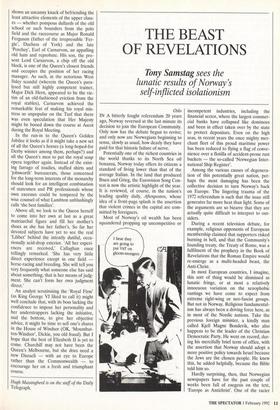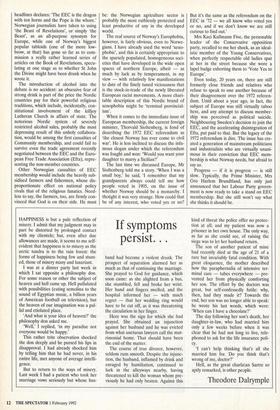THE BEAST OF REVELATIONS
Tony Samstag sees the
lunatic results of Norway's self-inflicted isolationism
Oslo IN A bitterly fought referendum 20 years ago, Norway reversed at the last minute its decision to, join the European Community. Only now has the debate begun to revive; and only now are Norwegians beginning to sense, slowly as usual, how dearly they have paid for that historic failure of nerve.
Potentially one of the richest countries in the world thanks to its North Sea oil bonanza, Norway today offers its citizens a standard of living lower than that of the average Italian. In the land that produced Ibsen and Grieg, the Eurovision Song Con- test is now the artistic highlight of the year. It is reviewed, of course, in the nation's leading quality daily, Aftenposten, whose idea of a front-page, splash is the assertion that violent crimes in the capital are com- mitted by foreigners.
Most of Norway's oil wealth has been squandered propping up uncompetitive or incompetent industries, including the financial sector, where the largest commer- cial banks have collapsed like dominoes and been in effect taken over by the state to protect depositors. Even on the high seas, in recent years the once mighty mer-
chant fleet of this proud maritime power has been reduced to flying a flag of conve- nience over a flotilla of accident-prone rust buckets — the so-called 'Norwegian Inter- national Ship Register'.
Among the various causes of degenera- tion of this potentially great nation, per- haps the most damaging has been the
collective decision to turn Norway's back on Europe. The lingering trauma of the
1972 referendum is such that the issue still generates far more heat than light. Some of the arguments are so bizarre that they are actually quite difficult to interpret to out- siders.
During a recent television debate, for example, religious opponents of European membership claimed that supporters risked burning in hell, and that the Community's founding treaty, the Treaty of Rome, was a fulfilment of the prophecy in the Book of Revelations that the Roman Empire would re-emerge as a multi-headed beast, the Anti-Christ.
In most European countries, I imagine, this sort of thing would be dismissed as lunatic fringe, or at most a relatively innocuous variation on the xenophobic rantings we have come to expect from extreme right-wing or neo-fascist groups.
But not in Norway. Religious fundamental- ism has always been a driving force here, as in most of the Nordic nations. Take the previous foreign minister, a kindly man called Kjell Magne Bondevik, who also happens to be the leader of the Christian Democratic Party. He went on record, dur- ing his mercifully brief term of office, with the assertion that Norway should adopt a more positive policy towards Israel because the Jews are the chosen people. He knew this, he added helpfully, because the Bible told him so.
Hardly surprising, then, that Norwegian newspapers have for the past couple of weeks been full of exegesis on the text, 'Europe as Antichrist'. One of the racier headlines declares: 'The EEC is the dragon with ten horns and the Pope is the whore.' Norwegian journalists have taken to using 'the Beast of Revelations', or simply 'the Beast', as an all-purpose synonym for Europe, while one of Norway's biggest popular tabloids (one of the more low- brow, at that) has gone so far as to com- mission a really rather learned series of articles on the Book of Revelations, specu- lating at one stage as to whether St John the Divine might have been drunk when he wrote it.
The introduction of alcohol into the debate is no accident: an obsessive fear of strong drink is part of the price the Nordic countries pay for their powerful religious traditions, which include, incidentally, con- stitutional involvement of the killjoy Lutheran Church in affairs of state. The notorious Nordic system of severely restricted alcohol sales, probably the most depressing result of this unholy collabora- tion, would be among the first casualties of Community membership, and could fail to survive even the trade agreement recently negotiated between the EEC and the Euro- pean Free Trade Association (Efta), repre- senting the non-member countries.
Other Norwegian casualties of EEC membership would include the heavily sub- sidised farmers and fishermen, whose dis- proportionate effect on national policy rivals that of the religious fanatics. Need- less to say, the farmers, too, are firmly con- vinced that God is on their side. He must be: the Norwegian agriculture sector is probably the most ruthlessly protected and least productive of any in the developed world.
The real source of Norway's Europhobia, however, is fairly obvious, even to Norwe- gians. I have already used the word 'xeno- phobic', and this is certainly appropriate to the sparsely populated, homogeneous soci- eties that have developed in the wide open spaces of northern Europe, albeit — as much by luck as by temperament, in my view — with relatively few manifestations to date of the finely tuned viciousness that is the stock-in-trade of the newly liberated European racist movements. A more chari- table description of this Nordic brand of xenophobia might be 'terminal provincial- ism'.
When it comes to the immediate issue of European membership, the current foreign minister, Thorvald Stoltenberg, is fond of describing the 1972 EEC referendum as 'the closest Norway has ever come to civil war'. He is less inclined to discuss the infa- mous slogan under which the referendum was fought and won: 'Would you want your daughter to marry a Sicilian?'
The last time we discussed Europe, Mr Stoltenberg told me a story. 'When I was a small boy,' he said, 'I remember that my grandparents always could tell me how people voted in 1905, on the issue of whether Norway should be a monarchy. I thought it was very strange. How could that be of any interest, who voted yes or no? But it's the same as the referendum on the EEC in '72 — we all know who voted yes or no, and if we don't know we are still curious to find out.'
Mrs Kaci Kullmann Five, the personable leader of the Conservative opposition party, recalled to me her shock, as an ideal- istic member of the Young Conservatives, when perfectly respectable old ladies spat at her in the street because she wore a lapel badge exhorting them to 'Vote Yes to Europe'.
Even today, 20 years on, there are still formerly close friends and relatives who refuse to speak to one another because of their disagreement over the 1972 referen- dum. Until about a year ago, in fact, the subject of Europe was still virtually taboo here, and any attempt to discuss member- ship was perceived as political suicide. Neighbouring Sweden's decision to join the EEC, and the accelerating disintegration of Efta, put paid to that. But the legacy of the 1972 referendum is dire. The issue has cre- ated a generation of mainstream politicians and industrialists who are virtually unani- mous in their conviction that EEC mem- bership is what Norway needs, but afraid to say so.
Progress — if it is progress — is still slow. Typically, the Prime Minister, Mrs Gro Harlem Brundtland, has only just announced that her Labour Party govern- ment is now ready to take a stand on EEC membership. But she still won't say what she thinks it should be.



















































 Previous page
Previous page